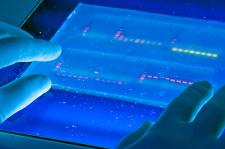Should We Synthesize A Human Genome?
By Drew Endy and Laurie Zoloth,
DSpace@MIT
| 05. 10. 2016
At Harvard today an invitation-only group of mostly scientists, lawyers, and entrepreneurs, ~150 in total, met to discuss if and how to synthesize from scratch an entire human genome – the heritable genetic material that in nature is transferred from parents to children. The meeting was originally organized to focus on “deliverables and industry involvement” with the primary goal of the project being “to synthesize a complete human genome in a cell line within a period of ten years.”
Synthesis refers to the construction of a genome starting from simple chemicals. Such a synthetic genome could then be tested in a laboratory by replacing the existing genome within a human cell. All this would still be far removed from making a synthetic human. However, the possibility of making a human cell whose genome is realized from only digital information and raw materials should trigger broader considerations.
...
Returning to our primary question, just because something becomes possible, how should we determine if it is ethical to proceed?
Continue reading at DSpace@MIT...
Image via Flikr/University of Michigan School of Natural...
Related Articles
By Grace Won, KQED [with CGS' Katie Hasson] | 12.02.2025
In the U.S., it’s illegal to edit genes in human embryos with the intention of creating a genetically engineered baby. But according to the Wall Street Journal, Bay Area startups are focused on just that. It wouldn’t be the first...
Several recent Biopolitical Times posts (1, 2, 3, 4) have called attention to the alarmingly rapid commercialization of “designer baby” technologies: polygenic embryo screening (especially its use to purportedly screen for traits like intelligence), in vitro gametogenesis (lab-made eggs and sperm), and heritable genome editing (also termed embryo editing or reproductive gene editing). Those three, together with artificial wombs, have been dubbed the “Gattaca stack” by Brian Armstrong, CEO of the cryptocurrency company...
By Emily Glazer, Katherine Long, Amy Dockser Marcus, The Wall Street Journal | 11.08.2025
For months, a small company in San Francisco has been pursuing a secretive project: the birth of a genetically engineered baby.
Backed by OpenAI chief executive Sam Altman and his husband, along with Coinbase co-founder and CEO Brian Armstrong, the startup—called...
By Antonio Regalado, MIT Technology Review | 10.31.2025
A West Coast biotech entrepreneur says he’s secured $30 million to form a public-benefit company to study how to safely create genetically edited babies, marking the largest known investment into the taboo technology.
The new company, called Preventive, is...




